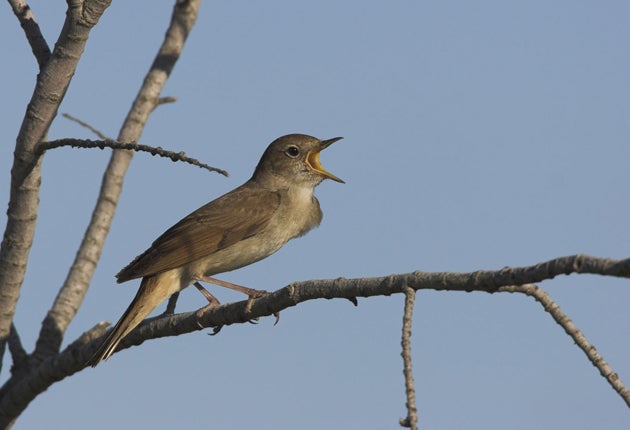Deer to blame for the decline of England's nightingales

Your support helps us to tell the story
From reproductive rights to climate change to Big Tech, The Independent is on the ground when the story is developing. Whether it's investigating the financials of Elon Musk's pro-Trump PAC or producing our latest documentary, 'The A Word', which shines a light on the American women fighting for reproductive rights, we know how important it is to parse out the facts from the messaging.
At such a critical moment in US history, we need reporters on the ground. Your donation allows us to keep sending journalists to speak to both sides of the story.
The Independent is trusted by Americans across the entire political spectrum. And unlike many other quality news outlets, we choose not to lock Americans out of our reporting and analysis with paywalls. We believe quality journalism should be available to everyone, paid for by those who can afford it.
Your support makes all the difference.Nightingales are disappearing from Britain because deer are eating the woodland undergrowth the birds need for nesting, a new study has shown. It is a significant breakthrough in understanding why numbers of the renowned songbird are rapidly falling.
Between 1994 and 2007, nightingale numbers in England – the bird is absent from Scotland and Wales – dropped by 60 per cent, and its range shrank towards the South-east, with concentrations limited to Kent, Sussex, Essex, Suffolk and Norfolk. The bird has vanished from many places where it was formerly loved for its remarkable song, which is sung in the dark and which has been celebrated in literature for thousands of years.
Researchers have suspected that one cause of the decline of the nightingale might be the destruction of woodland undergrowth – the nightingale's key habitat – by browsing deer whose numbers in Britain have increased in recent years. The prime culprit may be the muntjac – or barking – deer, a recently introduced species which is capable of breeding all the year round and which has no natural enemies. The animals' browsing is causing major changes in the structure of woodland vegetation, especially of the "understorey" of shrubs and bushes, which is, in effect, being eaten to bits.
The link between deer browsing and the decline of the nightingale has been established by Chas Holt, a doctorate student at the University of East Anglia who is working for the British Trust for Ornithology. His research showed that nightingales in a wood spent most of their time in a tiny part of the woodland from which deer had been excluded, thus preventing them from browsing the undergrowth. Mr Holt radio-tagged nightingales in Bradfield Woods in Suffolk and established paired plots of woodland, half with deer allowed in, and half with them kept out. He found that the density of nightingales was 15 times greater in the deer-free areas.
"The study provides compelling evidence that increasing deer pressure can have a major effect on local nightingale populations, and potentially those of other woodland species too," Mr Holt said. "Deer can reduce the suitability of woodland by eating the low vegetation that forms a critical part of the nightingale's habitat. When added to the other pressures being faced by migratory birds, it is not surprising that population levels of some species are falling rapidly."
Nightingales are one of a number of migratory birds which fly to England in the spring after spending the winter in Africa and whose numbers are rapidly declining. Those species include the turtle dove, the spotted flycatcher, the wood warbler and the cuckoo. Scientists believe they may all be facing problems in their wintering grounds in Africa and on their annual migrations of thousands of miles.
Join our commenting forum
Join thought-provoking conversations, follow other Independent readers and see their replies
Comments